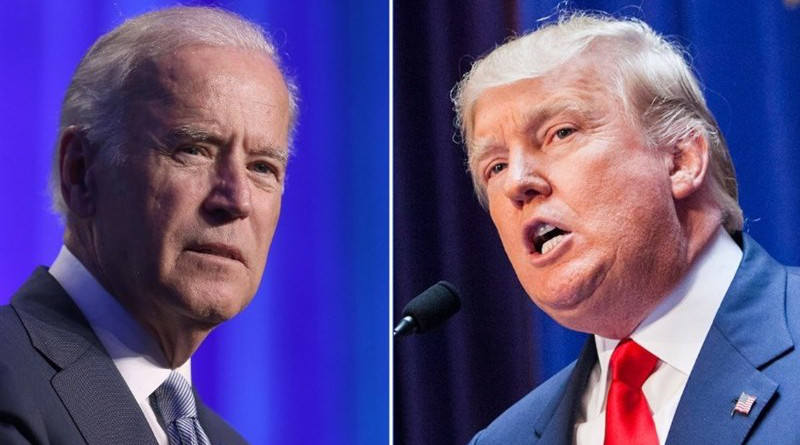The 2020 Presidential Campaign Remains In The Balance – OpEd
By Arab News
By Dr. John C. Hulsman*
An interesting and wholly unexpected political dynamic has reared its head in both the just-completed Democratic convention and in the ongoing Republican version: The art of counter-programming. This political tactic has it that both changing the subject and/or tackling a weakness head-on can pay significant political dividends. The US convention season, traditionally (ahead of the autumn debates) a policy light zone in any case, has seen both parties stray far from the two primary 2020 presidential issues of COVID-19 and violence in America’s cities amid massive civil rights protests.
Instead, we find the Democrats talking at length about the virtues of kindness, while the Republicans take head-on their enemies’ cries that they are barely veiled white nationalists. Intriguingly, in both cases, at least so far, the counter-programming has been highly effective, perhaps even altering overall narrative impediments both President Donald Trump and former Vice President Joe Biden have been laboring under.
In the Democrats case, the virtues of kindness — surely the first time such an issue has been highlighted in a modern political campaign — has paid narrative dividends. One of the most effective speakers at the Democratic convention was a young man with a stutter, who spoke movingly about how Biden (a lifelong sufferer) stopped to support him, going so far as to give him a book of the poetry of W.B. Yeats, suggesting that, as proved the case with him, reciting poetry could alleviate the condition.
Indeed, the standard narrative of Biden is that he is at base a fundamentally decent man. This stands in total contrast to the persona of Trump. Indeed, a June Fox News poll found that only 37 percent of respondents believe the president “cares about people like you,” while a decisive 57 percent say he does not.
This gets at the perceived negative aspects of Trump’s personality, as well-educated suburban voters (especially women) have deserted the Republican Party in droves, more due to Trump’s negative personality than over any substantial policy differences. Retaining these voters by highlighting Biden’s genuine bedrock decency in the end is not a peripheral concern. Instead, it is central to retaining the party’s advantage among suburban voters, who supported Trump in 2016, while decisively shifting toward the Democrats in the midterm elections of 2018.
For the Republicans, a dose of counter-programming has proven necessary too. In their case, while it is politically acceptable to be viewed as the party of American nationalism — as indeed Republicans have been since the time of Lincoln — it is decidedly neither socially nor politically all right to be seen as the party of white nationalism, a charge the Democrats have leveled at them to some effect following the advent of the George Floyd civil rights protests.
To the surprise of many, the Republicans have successfully taken this hot-button issue head-on. The early stages of their convention have seen African-American Sen. Tim Scott talk of his rise from Cotton to Congress in just one generation. Likewise, Trump’s former UN Ambassador, Niki Haley, of Indian ancestry, spoke movingly about how the party should become the home of all immigrant strivers. By showing a different, and unexpected, face to the American people through their convention, Republicans are hoping to challenge the settling (and highly detrimental) political narrative that they are the home of America’s shrinking white population, and little else.
Both the Democrats and Republicans did surprisingly well at their conventions.
Dr. John C. Hulsman
If this narrative takes hold, given fundamental changes in American demography, Republicans are doomed to lose national elections for the next generation. Instead, the surprisingly hopeful convention marked a good first step toward eradicating the party’s baleful negatives.
Conventions rarely if ever determine American presidential campaign outcomes. Indeed, even the more touted autumn debates only occasionally (as in the case of Kennedy-Nixon in 1960 and perhaps Carter-Reagan in 1980) tip the presidential scales. However, that does not mean they are unimportant, as they provide windows into the souls of the parties, showing us what they think their weaknesses and their strengths truly are.
In the case of the Republicans the party is rightly worried it is turning off the growing non-white percentage of the country’s voters. In the case of the Democrats, fearing Republican charges that their tilt to the left might damage them as the campaign reaches its climax, Democrats are showcasing Biden’s fundamental decency as a form of ideological insurance. Both parties did surprisingly well at their conventions; the 2020 presidential campaign remains in the balance.
- Dr. John C. Hulsman is the president and managing partner of John C. Hulsman Enterprises, a prominent global political risk consulting firm. He is also senior columnist for City AM, the newspaper of the City of London. He can be contacted via www.chartwellspeakers.com.

